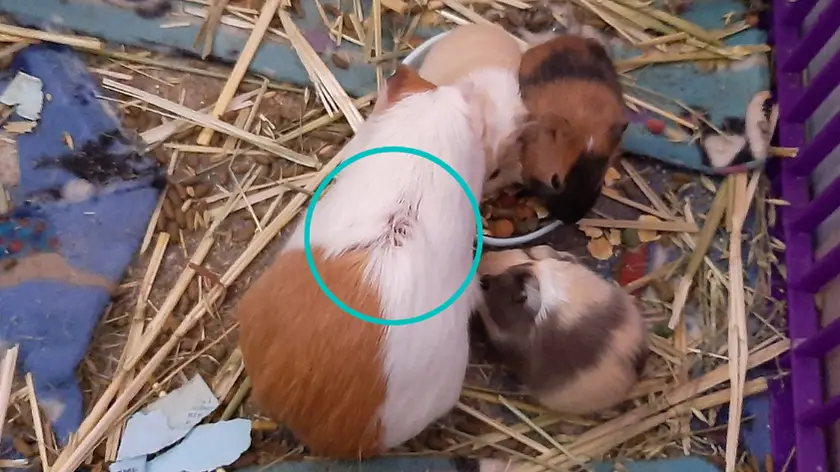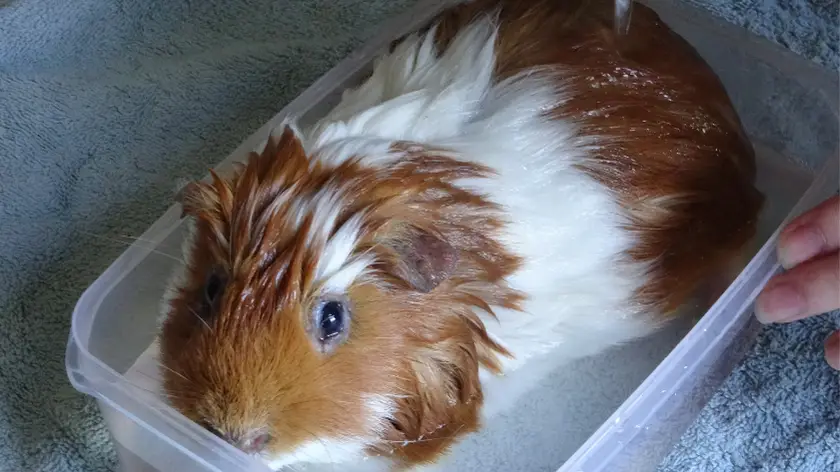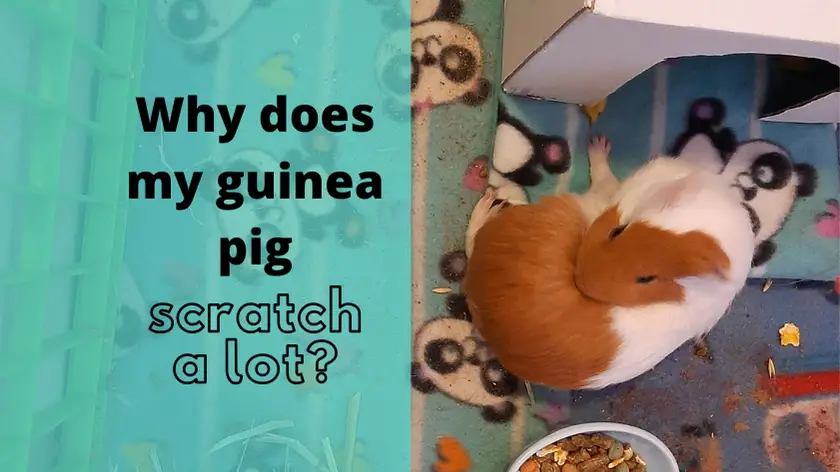There are a few things that can cause your guinea pig to scratch themselves a lot.
The main causes can be:
- mites
- lice
- ringworm (which is a fungal infection)
- or an allergic reaction
The good news is that all of these are treatable.
You might have to visit an exotic vet to diagnose what exactly the cause of the itching is and prescribe the correct treatment.
Occasional scratching may be normal, for instance when your guinea pig wakes up or grooms themselves they might have a quick scratch. This is nothing to worry about and is normal behavior.
How do you know if your guinea pig has mites?
The first sign that your guinea pig has a mite infestation is frequent scratching.
Unfortunately mites are not visible to the naked eye. They can cause discomfort, pain and sensitive inflamed skin.
Your guinea pig will eventually also experience hair loss, normally on their back and rump. Large bald spots will start to form and the skin might also appear red or raw with open sores. This will be very painful to your guinea pig and he will probably not want to be picked up.
When your notice open sores, your guinea pig will need immediate treatment. A vet can diagnose what treatment is necessary, in extreme cases they may even prescribe antibiotics if the sores are infected.

How do you treat mites in guinea pigs?
It’s best to catch a mite infestation early.
The most common treatment for mites will be a topical solution, shampoo or a spray that you can find at your local vet, this will kill off the parasites.
Ivermectin is also a common treatment for guinea pigs, but needs to be prescribed by a vet.
Once the infestation is gone, your guinea pigs’ skin will heal and their hair will start to regrow. They will be back to their normal self in no time.

What’s the difference between lice and mites?
These are both common parasites that can affect your guinea pigs, but there is a difference.
Mites
Guinea pigs can be affected by two types of mites: static mites and sarcoptic (mange) mites.
Static mites live in your guinea pigs hair.
Sarcoptic (mange) mites burrow under a guinea pig’s skin.
Both of these types of mites will cause your guinea pig to itch and scratch, but sarcoptic mites will cause mange and a lot of pain.
Remember mites can not be seen with the naked eye.
Lice
Lice on guinea pigs will cause itching and scratching and you will be able to see them (and their eggs) on your guinea pig.
Treat lice immediately when you suspect that your guinea pig is infested, because they can spread to other guinea pigs and bedding.
When treating your guinea pig, remember to also change their bedding.
Can guinea pigs get mites from hay?
Guinea pigs can get mites from hay. They can also get mites form bedding, food or toys.
These parasites can live up to three weeks without a host and can pass to your guinea pig on contact.
Can mites kill a guinea pig?
Static mites that live in your guinea pig’s hair is more unpleasant than life threatening.
Sarcoptic (mange) mites however is another story and can ultimately lead to a guinea pig’s death if not treated.
Can humans get mites form guinea pigs?
Guinea pig mites are species specific, so there is very little chance that they can infect humans.
Guinea pig mites can not live on humans. They can however cause irritation or a rash to sensitive human skin.
How do guinea pigs get infested with mites?
These small parasites can spread from guinea pig to guinea pig, if they come into contact with a mite infested guinea pig.
Your guinea pig can also get mites from infested hay, food, bedding or toys.
Ringworm
Ringworm in reality is actually not a worm, but a fungus infection.
How do you know if your guinea pig has ringworm?
Ringworm will cause lesions around your guinea pig’s head area with hair loss, crusting and scabbing.
This can spread to the rest of the body and become itchy.
Ringworm can spread to humans so wash your hands thoroughly after handling or treating your guinea pig. Consult your pharmacist or doctor if you develop any lesions on your skin.
How to treat ringworm in guinea pig’s?
After ringworm is diagnosed, your guinea pig and all cage mates should be treated.
Treatment options for ringworm include: specific shampoo, ointment/cream or oral medicine, all of these will be available at your local vet shop.
If you suspect that your guinea pig has any of these parasites, it is in their best interest that you act immediately to get rid of the infestation. A parasite infestation will cause a lot of discomfort to your guinea pig and if left untreated can cause a lot of pain and even lead to death in some cases.

